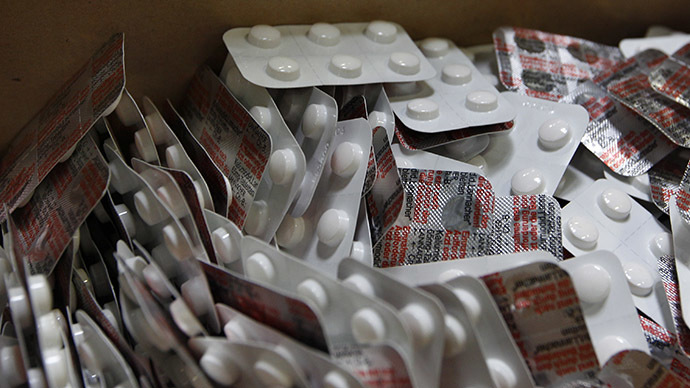Leaked TPP document shows US favoring Big Pharma

US negotiators in Trans-Pacific Partnership (TPP) talks fought on behalf of big drug-making companies, championing intellectual property laws that would protect their profits from competition by generic medications, leaked documents have revealed.
The protections proposed by US trade representatives may even transcend US patent laws, according to a draft copy of TPP’s intellectual property chapter leaked to Politico this week. The 90-page document, leaked to the paper by a critic of the trade deal, contains the draft proposal as it stood on May 11, before the latest TPP talks in Guam.
Is the White House going to bat for Big Pharma worldwide? http://t.co/ldiOZCfZ7T | AP Photo pic.twitter.com/Lz9cwRpIIV
— POLITICO (@politico) July 1, 2015
Provisions in the draft text could make it extremely difficult for makers of generic drugs to compete with brand-name pharmaceuticals overseas, notes Politico. They would also block the sales inside the US of generic “biologics,” new and expensive treatments for dangerous maladies, thus restricting Americans’ treatment options.
READ MORE: 'Profits over public health': Secret TPP Healthcare Annex published by WikiLeaks
The resulting increase in health care costs to patients, companies and governments in both the US and the other 11 nations involved in the TPP could amount to “trillions” of dollars, the paper says.
On every issue discussed in the chapter – from duration and extension of patents to data retention by pharmaceutical companies – US negotiators advocated the position of big drug companies and always demanded stricter intellectual property provisions, the document indicates.
Among the most controversial provisions in the draft document is the US insistence on “patent linkage,” which would bar governments of TPP member countries from approving generic drugs if there were any outstanding patent disputes. This would allow drug companies to quash competing generics simply by filing patent claims.
“There’s very little distance between what Pharma wants and what the US is demanding,” Rohit Malpani, director of policy for Doctors Without Borders, told Politico.
Just like your textbook teaches, free trade is when pharma outlaws low-cost generics http://t.co/Rxs0hWeChIpic.twitter.com/6YaAjKSJCr
— Matt O'Brien (@ObsoleteDogma) July 1, 2015
While Obama administration officials refused to authenticate the leaked document, or discuss its contents directly, they said nothing in the drafts should be considered settled until the entire deal has been finalized.
“The negotiations on intellectual property are complex and continually evolving,” said Trevor Kincaid, a spokesman for US Trade Representative Michael Froman. “On pharmaceutical products, we are working closely with stakeholders, Congress, and partner countries to develop an approach that aims to make affordable life-saving medicine more widely available while creating incentives for the development of new treatments and cures. Striking this important balance is at the heart of our work.”
Jay Taylor, vice president of the Pharmaceutical Research and Manufacturers of America, told Politico that intellectual property protections were crucial to protect the results of expensive research and enable drug companies to continue developing new medications.
“These innovations could be severely hindered if IP protections are scaled back,” Taylor said. “This is especially important in the area of biologic medicines, which could hold the key to unlocking treatments for diseases that have thwarted researchers for years.”
Malpani, of Doctors Without Borders, fears that TPP could set a dangerous precedent for future trade deals, none of which would be allowed to roll back any of its provisions, and drown the generic drug-makers in regulations and lawsuits.
“We consider this the worst-ever agreement in terms of access to medicine,” he said. “It would create higher drug prices around the world—and in the US, too.”
In pushing for “fast-track” powers to negotiate the TPP and other free-trade treaties, President Obama found himself backed by the Republicans and opposed by his own Democratic Party. After several months of heated debate, both the House and the Senate passed a bill giving the White House trade promotion authority through 2018.
Under the terms of the law, Congress will be able to approve or reject the treaties, but not offer amendments.












